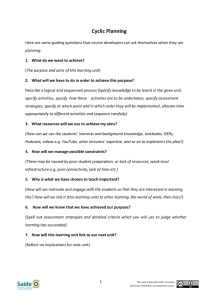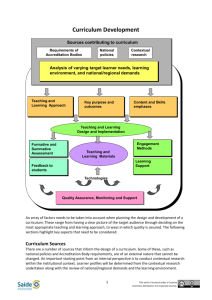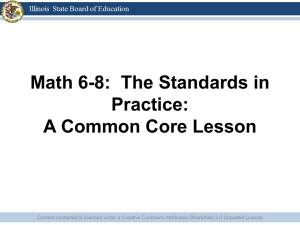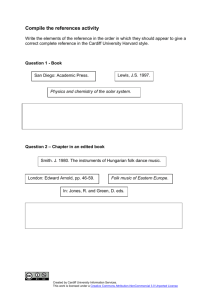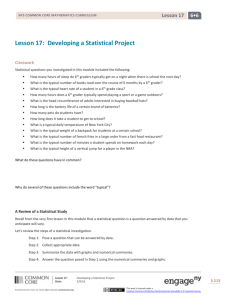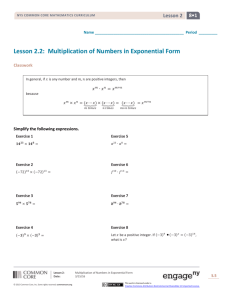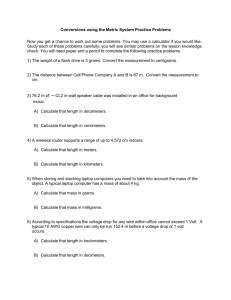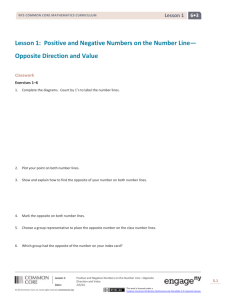Syllabi - Affordable Learning Georgia
advertisement
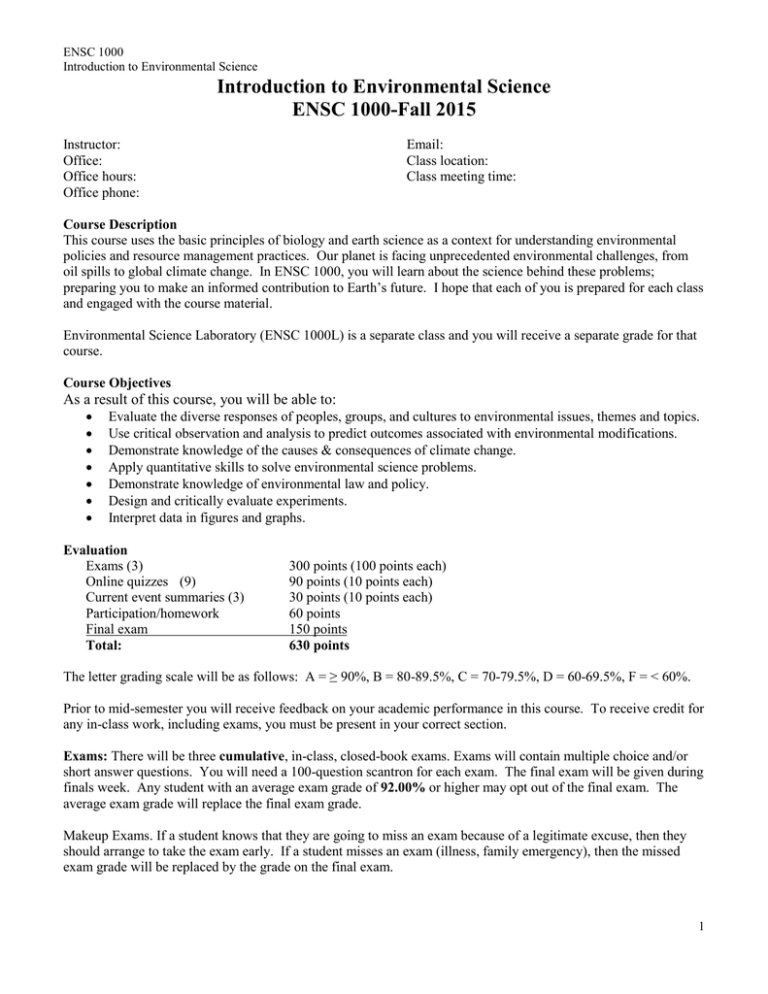
ENSC 1000 Introduction to Environmental Science Introduction to Environmental Science ENSC 1000-Fall 2015 Instructor: Office: Office hours: Office phone: Email: Class location: Class meeting time: Course Description This course uses the basic principles of biology and earth science as a context for understanding environmental policies and resource management practices. Our planet is facing unprecedented environmental challenges, from oil spills to global climate change. In ENSC 1000, you will learn about the science behind these problems; preparing you to make an informed contribution to Earth’s future. I hope that each of you is prepared for each class and engaged with the course material. Environmental Science Laboratory (ENSC 1000L) is a separate class and you will receive a separate grade for that course. Course Objectives As a result of this course, you will be able to: Evaluate the diverse responses of peoples, groups, and cultures to environmental issues, themes and topics. Use critical observation and analysis to predict outcomes associated with environmental modifications. Demonstrate knowledge of the causes & consequences of climate change. Apply quantitative skills to solve environmental science problems. Demonstrate knowledge of environmental law and policy. Design and critically evaluate experiments. Interpret data in figures and graphs. Evaluation Exams (3) Online quizzes (9) Current event summaries (3) Participation/homework Final exam Total: 300 points (100 points each) 90 points (10 points each) 30 points (10 points each) 60 points 150 points 630 points The letter grading scale will be as follows: A = ≥ 90%, B = 80-89.5%, C = 70-79.5%, D = 60-69.5%, F = < 60%. Prior to mid-semester you will receive feedback on your academic performance in this course. To receive credit for any in-class work, including exams, you must be present in your correct section. Exams: There will be three cumulative, in-class, closed-book exams. Exams will contain multiple choice and/or short answer questions. You will need a 100-question scantron for each exam. The final exam will be given during finals week. Any student with an average exam grade of 92.00% or higher may opt out of the final exam. The average exam grade will replace the final exam grade. Makeup Exams. If a student knows that they are going to miss an exam because of a legitimate excuse, then they should arrange to take the exam early. If a student misses an exam (illness, family emergency), then the missed exam grade will be replaced by the grade on the final exam. 1 ENSC 1000 Introduction to Environmental Science Quizzes: There will be ten 1-hour online quizzes administered on GaView within a 48-hour window. You can use any notes you want, but you need to work individually. These 5 or 10 question multiple choice quizzes will cover upcoming lecture material. The point of these quizzes is to ensure that you read the textbook material before lecture. For each quiz, I will indicate which topics and textbook pages will be covered. You cannot makeup missed quizzes. The lowest quiz grade will be dropped. To earn a good grade on the quizzes, I recommend reading the assigned chapters or articles and taking notes while reading before starting the online quiz. Current Events: An essential component of environmental science is awareness of the world around you. Therefore, you will be expected to submit 3 current event summaries of not more than 600 words. Details and an example will be posted online. You should submit all current event summaries online by 11:59PM on their due date. Participation: Your participation grade will be based on in-class activities, in-class quizzes, and/or short assignments. You cannot makeup missed in-class work. Textbook (required): Our free, OER (open educational resource) textbook is available online. This resource was created by faculty in the Environmental Science program at Georgia College specifically for this course. This link will take you to your textbook. Each textbook chapter is a separate tab. The separate chapters are also posted on GeorgiaView. http://libguides.gcsu.edu/ensc1000/course-overview Course Format. Our course will consist of lectures, discussions, individual activities, small group activities, and whole-class exercises. I strongly encourage you to participate and am happy to address questions at any time: before, during, or after class. We will be using GeorgiaVIEW / D2L for course communications, announcements, and assignment submissions. It is your responsibility to check our page regularly for announcements, assignments, clarifications, etc. Please communicate with me through. Lecture notes will be posted. The notes are meant to assist you with taking notes and organizing information in class. Online lecture notes will not contain all the information necessary to pass exams. You will need to bring the notes to class, pay attention, take notes and think during class. All assignments are expected to be submitted on time and online via GeorgiaVIEW. It is your responsibility to check to make sure that your submissions go through. Assignments are due by MIDNIGHT of the due date. All assignments must be submitted as .pdf, .doc or .docx files GeorgiaView: https://gcsu.view.usg.edu/ Username: firstname_lastname Password – original pin from Banner (Birthday: mmddyy) or PAWS password Academic Atmosphere Attendance. I will not be taking attendance in class. However, you cannot makeup missed quizzes or graded class work. Additionally, it will be very difficult for you to pass the exams if you do not attend class. Time Commitment. You should expect to spend a minimum of 6 hours per week on this class: 2.5 hours in the classroom, 3.5 hours reviewing/studying/reading. Integrity. We will all treat each other with respect and dignity. You are expected to abide by all policies on academic honesty, as stated in the Georgia College and State University Honor Code. It is your responsibility to complete and represent your work honestly and to demonstrate respect of others’ academic endeavors. Violations of the honor code (including all plagiarism - from web sites, books, other students, etc.) will be treated seriously and will result in you failing the assignment and/or the entire course. If a student is caught cheating on an exam, then that student will receive a failing grade for the course. For more information, see the GC&SU catalog, or http://www.gcsu.edu/student_affairs/Student_Handbook/honor/honor.html Cell phone policy: Cell phones off during class and no texting. There is no point is showing up to class if you are going to chat with your friends throughout the lecture. 2 ENSC 1000 Introduction to Environmental Science Religious Observance Policy. Students are permitted to miss class in observance of religious holidays and other activities observed by a religious group of which the student is a member without academic penalty. Exercising of one’s rights under this policy is subject to the GC Honor Code. Students who miss class in observance of a religious holiday or event are required to make up the coursework missed as a result from the absence. The nature of the make-up assignments and the deadline for completion of such assignments are at the sole discretion of the instructor. Failure to follow the prescribed procedures voids all student rights under this policy. If you are going to miss class because of a religious holiday, then you need to contact me at least 1 week prior to class and arrange to makeup the missed work. Assistance for Student Needs Related to Disability. If you have a disability as described by the Americans with Disabilities Act (ADA) and the Rehabilitation Act of 1973, Section 504, you may be eligible to receive accommodations to assist in programmatic and physical accessibility. Disability Services, a unit of the GCSU Office of Institutional Equity and Diversity, can assist you in formulating a reasonable accommodation plan and in providing support in developing appropriate accommodations to ensure equal access to all GCSU programs and facilities. Course requirements will not be waived, but accommodations may assist you in meeting the requirements. For documentation requirements and for additional information, we recommend that you contact Disability Services located in Maxwell Student Union at 478-445-5931 or 478-445-4233. Student Opinion Surveys statement. Given the technological sophistication of Georgia College students, the student opinion survey is being delivered through an online process. Your constructive feedback plays an indispensable role in shaping quality education at Georgia College. All responses are completely confidential and your name is not stored with your responses in any way. In addition, instructors will not see any results of the opinion survey until after final grades are submitted to the University. An invitation to complete the online opinion survey is distributed to students near the end of the semester. Your participation in this very important process is greatly appreciated. Academic Honesty. The integrity of students and their written and oral work is a critical component of the academic process. The submission of another’s work as one’s own is plagiarism and will be dealt with using the procedures outlined in the following link http://catalog.gcsu.edu/ugrad/student-academic-dishonesty.htm. Remember that allowing another student to copy one’s own work violates standards of academic integrity. Also see the student Honor Code at the website: http://www.gcsu.edu/studentlife/handbook/code.htm Fire Drills. Fire drills will be conducted annually. In the event of a fire alarm, students will exit the building in a quick and orderly manner through the nearest hallway exit. Learn the floor plan and exits of the building. Do not use elevators. If you encounter heavy smoke, crawl on the floor so as to gain fresh air. Assist disabled persons and others if possible without endangering your own life. Assemble for a head count on the front lawn of main campus or other designated assembly area. For more information on other emergencies, please visit http://www.gcsu.edu/emergency/actionplanmain.htm Topics Population Ecology The Human Population Energy – Fossil fuels Energy – Nuclear energy Energy – Alternative energy Air pollution The Clean Air Act Carbon Cycle Greenhouse effect Global Climate Change Water management Water pollution 3 ENSC 1000 Introduction to Environmental Science Course schedule Week Topic Week 1 Intro Week 1 Introduction Week 1 Scientific method activity Textbook link and information Chapter 1: Introduction http://libguides.gcsu.edu/ensc1000/introduction Author: Dr. Kalina Manoylov Attribution - Noncommercial - ShareAlike 3.0 Unported This work is licensed under a Creative Commons AttributionNonCommercial-ShareAlike 3.0 Unported License. Week 2 Week 2 Week 2 Population Ecology (exponential & logistic) Population Ecology (logistic & survivorship curves) Population ecology handout Chapter 2: Population Ecology http://libguides.gcsu.edu/ensc1000/population-ecology Author: Dr. Caralyn Zehnder Attribution - Noncommercial - ShareAlike 3.0 Unported This work is licensed under a Creative Commons AttributionNonCommercial-ShareAlike 3.0 Unported License. Week 3 Week 3 Week 3 Week 4 Week 4 Human demography Human demography Human demography Labor Day - no class Human population handout Chapter 3: Human Demography http://libguides.gcsu.edu/ensc1000/human-demography Author: Dr. Caralyn Zehnder Attribution - Noncommercial - ShareAlike 3.0 Unported This work is licensed under a Creative Commons AttributionNonCommercial-ShareAlike 3.0 Unported License. Week 4 Week 5 Exam 1 Fossil fuels - coal Chapter 4: Non-renewable energy http://libguides.gcsu.edu/ensc1000/non-renewable-energy Author: Dr. Christine Mutiti Attribution - Noncommercial - ShareAlike 3.0 Unported This work is licensed under a Creative Commons AttributionNonCommercial-ShareAlike 3.0 Unported License Week 5 Mercury case study Week 5 Week 6 Week 6 Review Exam 1 Oil & natural gas Nuclear Tuna for Lunch? Case Study http://sciencecases.lib.buffalo.edu/cs/collection/detail.asp?case _id=549&id=549 Chapter 4: Non-renewable energy http://libguides.gcsu.edu/ensc1000/non-renewable-energy 4 ENSC 1000 Introduction to Environmental Science Week 6 nonrenewable energy handout Author: Dr. Christine Mutiti Attribution - Noncommercial - ShareAlike 3.0 Unported This work is licensed under a Creative Commons AttributionNonCommercial-ShareAlike 3.0 Unported License Week 7 Week 7 Week 7 Alternative energy Alternative energy Alternative energy Chapter 5: Alternative Energy http://libguides.gcsu.edu/ensc1000/alternative-energy Author: Dr. Kalina Manoylov Attribution - Noncommercial - ShareAlike 3.0 Unported This work is licensed under a Creative Commons AttributionNonCommercial-ShareAlike 3.0 Unported License. Week 8 Week 8 Air pollution Air pollution Chapter 6: Air Pollution http://libguides.gcsu.edu/ensc1000/air-pollution Author: Dr. Christine Mutiti Attribution - Noncommercial - ShareAlike 3.0 Unported This work is licensed under a Creative Commons AttributionNonCommercial-ShareAlike 3.0 Unported License Week 8 Week 9 Week 9 Week 9 Exam 2 Fall break - no class Review Exam 2 Carbon cycle Chapter 7: Climate change 7.1: The carbon cycle http://libguides.gcsu.edu/ensc1000/climate-change Author: Dr. Allison VandeVoort Attribution - Noncommercial - ShareAlike 3.0 Unported This work is licensed under a Creative Commons AttributionNonCommercial-ShareAlike 3.0 Unported License Week 10 Week 10 Week 10 Global Climate Change Global Climate Change Global Climate Change - handout Chapter 7: Climate change 7.2: The Science of Climate Change http://libguides.gcsu.edu/ensc1000/climate-change Author: Dr. Allison VandeVoort Attribution - Noncommercial - ShareAlike 3.0 Unported This work is licensed under a Creative Commons AttributionNonCommercial-ShareAlike 3.0 Unported License Week Consequences of climate change Chapter 7: Climate change 5 ENSC 1000 Introduction to Environmental Science 11 Week 11 Week 11 Week 12 Week 12 Week 12 Week 13 Week 13 Week 13 Week 14 Week 14 Week 14 Week 15 Week 15 Week 15 Week 16 Week 16 Week 16 Consequences of climate change 7.3: The consequences of climate change http://libguides.gcsu.edu/ensc1000/climate-change Author: Dr. Allison VandeVoort Consequences of climate change Attribution - Noncommercial - ShareAlike 3.0 Unported Climate change jigsaw Climate change jigsaw This work is licensed under a Creative Commons AttributionNonCommercial-ShareAlike 3.0 Unported License Properties of water Chapter 8: Water http://libguides.gcsu.edu/ensc1000/water Author: Dr. Sam Mutiti Water cycle (groundwater / surface water) Water cycle (groundwater / surface water) Water handout water scarcity, desalination Attribution - Noncommercial - ShareAlike 3.0 Unported This work is licensed under a Creative Commons AttributionNonCommercial-ShareAlike 3.0 Unported License Water review Exam 3 Review Exam 3 Thanksgiving - no class Thanksgiving - no class Water pollution Water pollution Chapter 8: Water http://libguides.gcsu.edu/ensc1000/water Author: Dr. Sam Mutiti Attribution - Noncommercial - ShareAlike 3.0 Unported Water management & Clean Water Act This work is licensed under a Creative Commons AttributionNonCommercial-ShareAlike 3.0 Unported License Week 17 Review & final exams. 6
